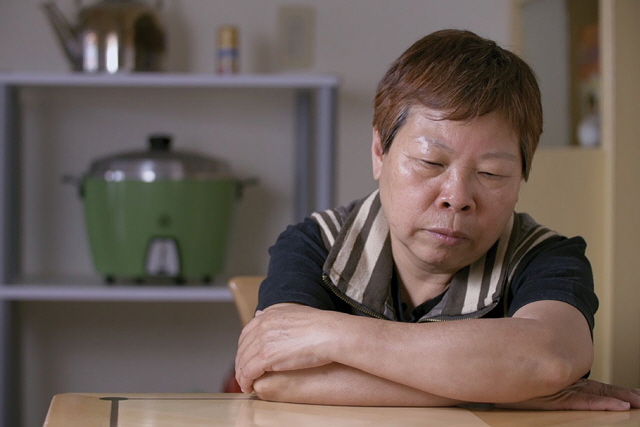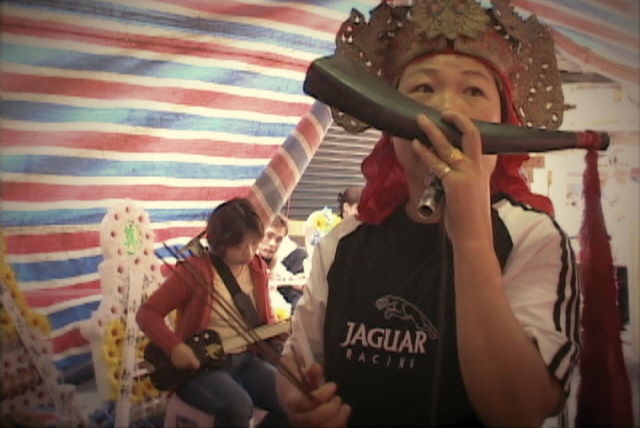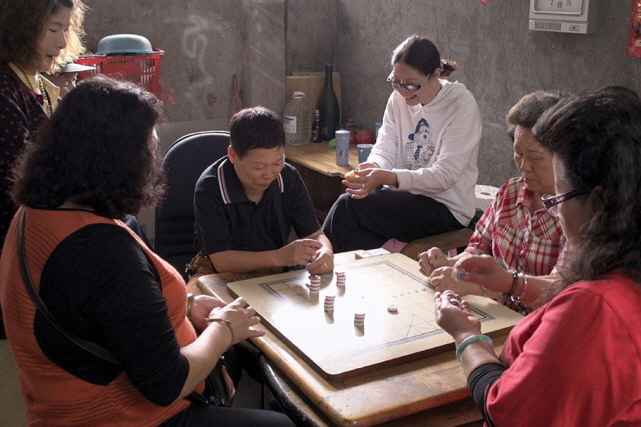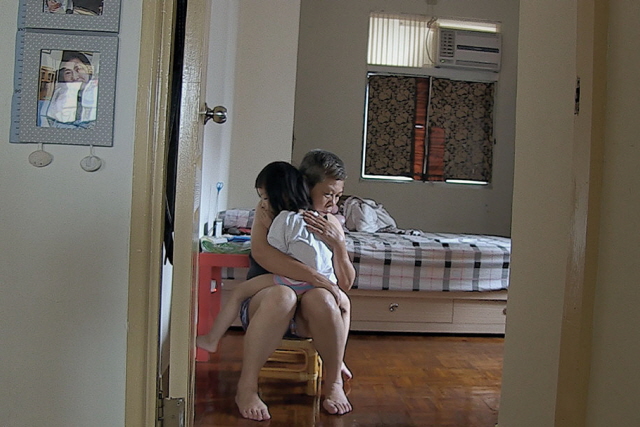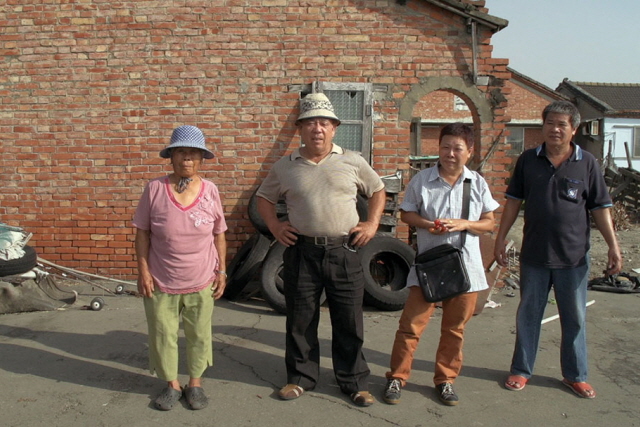19th(2017)
- Opening Film (1)
- New Currents (40)
- Polemics: Technofeminism - Women, Science & SF (9)
- Feminist Film Classics (9)
- Queer Rainbow (18)
- Asian Short Film & Video Competition (20)
- I-TEENS (7)
- Documentary Ock Rang Award (1)
- Barrier Free Screening (1)
- An ICON of Korean Film History, PARK Nam-ok (1)
- In Memory of KIM Sun-min (6)
Small Talk
 트레일러 재생
트레일러 재생
HUANG Hui-chen
- Taiwan
- 2016
- 88min
- DCP
- color
- Documentary
SYNOPSIS
Korean Premiere
SYNOPSIS
Every morning, my mother wakes up, prepares my lunch, and takes off. Every evening, my mom comes home, washes up, closes her bedroom door, and is asleep by 9PM. We live in the same space, my mother and I. But for decades now, we are like strangers under one roof. No hellos, no goodbyes, and no “I love you.” Silence permeates our house as I watch her, knowing that beneath the deafening silence lies a secret that weighs heavily on her and knowing that behind her tightly pursed lips is a shame so overbearing that it suffocates her. One day, I finally summon up the courage to sit her down and make her talk. But am I ready to hear what she has to say? Are we ready to face what’s been buried for so long?
PROGRAM NOTE
The director of Small Talk, HUANG Hui-chen lives with her mother Anu, but their relationship is no better than that of strangers. Anu is cold and stern at home, but when outside with her friends, exuberantly shines with her charming personality. Where is this dissonance coming from? Where did their relationship go wrong? Wanting to confront the questions that have tormented her for decades, Hui-chen begins a painful journey of the past with her mother by initiating a conversation with her. However, the conversation captured by the long-take from the fixed camera is full of suffocating silence. Eventually, Hui-chen begins to understand her mother a little by interviewing her mother’s siblings and her former girlfriends. Anu, a butch lesbian, adhered to the Taiwanese traditions in the 1970’s by complying to an arranged marriage, and ran away from her abusive husband with her two daughters. Her marriage, which forced her to abandon her identity and made her a victim of domestic violence, only rekindles indignation and loss of dignity. The portrait of an aged Asian lesbian drawn by her own daughter, this film honestly and deeply sheds light on the hostility of the society, which has isolated and violently hurt these women. The compulsary heterosexuality and domestic violence still has an impact on the mother and daughter, even long after they have left their husband and father. It is for this reason that their last conversation, which reveals that Anu has been neglecting her daughter’s hurt and pain just like how Anu’s family members were uncomfortable about and therefore ignored and shied away from her lesbian identity, is even sadder. The director sees this painful conversation as a small but important foundation for the start of a change, a shift in the relationship. I wish to applaud this film’s courage and strength, which shine brightly within its simple aesthetics. (CHO HyeYoung)
SYNOPSIS
Every morning, my mother wakes up, prepares my lunch, and takes off. Every evening, my mom comes home, washes up, closes her bedroom door, and is asleep by 9PM. We live in the same space, my mother and I. But for decades now, we are like strangers under one roof. No hellos, no goodbyes, and no “I love you.” Silence permeates our house as I watch her, knowing that beneath the deafening silence lies a secret that weighs heavily on her and knowing that behind her tightly pursed lips is a shame so overbearing that it suffocates her. One day, I finally summon up the courage to sit her down and make her talk. But am I ready to hear what she has to say? Are we ready to face what’s been buried for so long?
PROGRAM NOTE
The director of Small Talk, HUANG Hui-chen lives with her mother Anu, but their relationship is no better than that of strangers. Anu is cold and stern at home, but when outside with her friends, exuberantly shines with her charming personality. Where is this dissonance coming from? Where did their relationship go wrong? Wanting to confront the questions that have tormented her for decades, Hui-chen begins a painful journey of the past with her mother by initiating a conversation with her. However, the conversation captured by the long-take from the fixed camera is full of suffocating silence. Eventually, Hui-chen begins to understand her mother a little by interviewing her mother’s siblings and her former girlfriends. Anu, a butch lesbian, adhered to the Taiwanese traditions in the 1970’s by complying to an arranged marriage, and ran away from her abusive husband with her two daughters. Her marriage, which forced her to abandon her identity and made her a victim of domestic violence, only rekindles indignation and loss of dignity. The portrait of an aged Asian lesbian drawn by her own daughter, this film honestly and deeply sheds light on the hostility of the society, which has isolated and violently hurt these women. The compulsary heterosexuality and domestic violence still has an impact on the mother and daughter, even long after they have left their husband and father. It is for this reason that their last conversation, which reveals that Anu has been neglecting her daughter’s hurt and pain just like how Anu’s family members were uncomfortable about and therefore ignored and shied away from her lesbian identity, is even sadder. The director sees this painful conversation as a small but important foundation for the start of a change, a shift in the relationship. I wish to applaud this film’s courage and strength, which shine brightly within its simple aesthetics. (CHO HyeYoung)
PROGRAM NOTE
Korean Premiere
SYNOPSIS
Every morning, my mother wakes up, prepares my lunch, and takes off. Every evening, my mom comes home, washes up, closes her bedroom door, and is asleep by 9PM. We live in the same space, my mother and I. But for decades now, we are like strangers under one roof. No hellos, no goodbyes, and no “I love you.” Silence permeates our house as I watch her, knowing that beneath the deafening silence lies a secret that weighs heavily on her and knowing that behind her tightly pursed lips is a shame so overbearing that it suffocates her. One day, I finally summon up the courage to sit her down and make her talk. But am I ready to hear what she has to say? Are we ready to face what’s been buried for so long?
PROGRAM NOTE
The director of Small Talk, HUANG Hui-chen lives with her mother Anu, but their relationship is no better than that of strangers. Anu is cold and stern at home, but when outside with her friends, exuberantly shines with her charming personality. Where is this dissonance coming from? Where did their relationship go wrong? Wanting to confront the questions that have tormented her for decades, Hui-chen begins a painful journey of the past with her mother by initiating a conversation with her. However, the conversation captured by the long-take from the fixed camera is full of suffocating silence. Eventually, Hui-chen begins to understand her mother a little by interviewing her mother’s siblings and her former girlfriends. Anu, a butch lesbian, adhered to the Taiwanese traditions in the 1970’s by complying to an arranged marriage, and ran away from her abusive husband with her two daughters. Her marriage, which forced her to abandon her identity and made her a victim of domestic violence, only rekindles indignation and loss of dignity. The portrait of an aged Asian lesbian drawn by her own daughter, this film honestly and deeply sheds light on the hostility of the society, which has isolated and violently hurt these women. The compulsary heterosexuality and domestic violence still has an impact on the mother and daughter, even long after they have left their husband and father. It is for this reason that their last conversation, which reveals that Anu has been neglecting her daughter’s hurt and pain just like how Anu’s family members were uncomfortable about and therefore ignored and shied away from her lesbian identity, is even sadder. The director sees this painful conversation as a small but important foundation for the start of a change, a shift in the relationship. I wish to applaud this film’s courage and strength, which shine brightly within its simple aesthetics. (CHO HyeYoung)
SYNOPSIS
Every morning, my mother wakes up, prepares my lunch, and takes off. Every evening, my mom comes home, washes up, closes her bedroom door, and is asleep by 9PM. We live in the same space, my mother and I. But for decades now, we are like strangers under one roof. No hellos, no goodbyes, and no “I love you.” Silence permeates our house as I watch her, knowing that beneath the deafening silence lies a secret that weighs heavily on her and knowing that behind her tightly pursed lips is a shame so overbearing that it suffocates her. One day, I finally summon up the courage to sit her down and make her talk. But am I ready to hear what she has to say? Are we ready to face what’s been buried for so long?
PROGRAM NOTE
The director of Small Talk, HUANG Hui-chen lives with her mother Anu, but their relationship is no better than that of strangers. Anu is cold and stern at home, but when outside with her friends, exuberantly shines with her charming personality. Where is this dissonance coming from? Where did their relationship go wrong? Wanting to confront the questions that have tormented her for decades, Hui-chen begins a painful journey of the past with her mother by initiating a conversation with her. However, the conversation captured by the long-take from the fixed camera is full of suffocating silence. Eventually, Hui-chen begins to understand her mother a little by interviewing her mother’s siblings and her former girlfriends. Anu, a butch lesbian, adhered to the Taiwanese traditions in the 1970’s by complying to an arranged marriage, and ran away from her abusive husband with her two daughters. Her marriage, which forced her to abandon her identity and made her a victim of domestic violence, only rekindles indignation and loss of dignity. The portrait of an aged Asian lesbian drawn by her own daughter, this film honestly and deeply sheds light on the hostility of the society, which has isolated and violently hurt these women. The compulsary heterosexuality and domestic violence still has an impact on the mother and daughter, even long after they have left their husband and father. It is for this reason that their last conversation, which reveals that Anu has been neglecting her daughter’s hurt and pain just like how Anu’s family members were uncomfortable about and therefore ignored and shied away from her lesbian identity, is even sadder. The director sees this painful conversation as a small but important foundation for the start of a change, a shift in the relationship. I wish to applaud this film’s courage and strength, which shine brightly within its simple aesthetics. (CHO HyeYoung)
Director
-

HUANG Hui-chenHUANG Hui-chen
HUANG Hui-chen is an activist, documentary filmmaker, and mother of a little girl. Prior to embarking on her first feature documentary, Hui-chen worked for NGOs such as the Taiwan International Workers Association and China Time’s Trade Union, advocating for labor rights and social justice. It was during this time that she began documenting the plight of the disadvantaged and the voiceless. Her intimate profiles of the less fortunate and the exploited became tools used for social change. Most recently, Hui-chen is currently working on her memoir to be published in 2017.
Credit
- ProducerDiana Chia-wen LEE
- Cinematography LIN Che
- Editor Jessica Wan-yu LIN
- Music LIM Giong, Point.(aspiration music productions)
- Sound Kiwi Inc.

